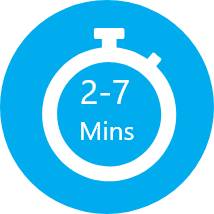Portable
TOBI PODHALER is compact and lightweight, and no refrigeration or power source required.


TOBI PODHALER is compact and lightweight, and no refrigeration or power source required.
TOBI PODHALER requires no disinfection. You can wipe the device with a clean and dry cloth.
Important Dosing Considerations
Please see Patient Information and Instructions For Use within the Prescribing Information.
TOBI® PODHALER® (Tobramycin Inhalation Powder) 28 mg per capsule is a prescription inhaled medication for cystic fibrosis patients whose lungs contain bacteria called Pseudomonas aeruginosa.
It is not known if TOBI PODHALER is safe and effective in patients under 6 years of age, in those with lung function outside of a certain range, or in those whose lungs contain bacteria called Burkholderia cepacia.
Do not swallow TOBI PODHALER capsules. TOBI PODHALER capsules are used only with the Podhaler device and inhaled through your mouth (oral inhalation). Never place a capsule in the mouthpiece of the Podhaler device.
You should not use TOBI PODHALER if you are allergic to it or to any other aminoglycoside antibacterial medicines.
Tell your doctor before starting treatment all of your medical conditions, including if you have or have had hearing problems, dizziness, kidney problems, muscle weakness, breathing problems such as wheezing, coughing or chest tightness, if you had an organ transplant, are pregnant or nursing or plan to become pregnant or nurse.
TOBI PODHALER contains a medicine that can harm your unborn baby. It is not known if it passes into breast milk. Check your baby for watery stools, bloody stools, thrush or diaper rash if you breast feed.
Tell your doctor about all the medicines you take including over-the-counter medicines, vitamins, and herbal supplements. If you are using TOBI PODHALER, discuss if you should take other medicines that may harm your nervous system, kidneys, or hearing; "water pills" (diuretics) such as EDECRIN® (ethacrynic acid), LASIX® (furosemide), or intravenous mannitol; urea.
TOBI PODHALER can cause serious side effects, including:
Severe breathing problems (bronchospasm). Tell your doctor right away if you get shortness of breath with wheezing or coughing and chest tightness while using TOBI PODHALER.
Hearing loss or ringing in the ears (ototoxicity). Tell your doctor right away if you have hearing loss, noises in your ears such as ringing or hissing, vertigo, difficulty with balance, dizziness, or your mother has had hearing problems after taking an aminoglycoside. Tell your doctor if you have been told you have certain gene variants (a change in the gene) related to hearing abnormalities inherited from your mother.
Worsening kidney problems (nephrotoxicity). TOBI PODHALER is in a class of medicines that may cause worsening kidney problems, especially in people with known or suspected kidney problems. Your healthcare provider may do a blood test to check how your kidneys are working while you are using TOBI PODHALER.
Worsening muscle weakness. TOBI PODHALER is in a class of medicines that can cause worsening muscle weakness in people who already have problems with muscle weakness (myasthenia gravis or Parkinson's disease).
TOBI PODHALER is in a class of medicines which may cause harm to an unborn baby.
The most common side effects of TOBI PODHALER include cough, worsening of lung problems or cystic fibrosis, productive cough, shortness of breath, fever, sore throat, changes in your voice (hoarseness), coughing up blood, and headache.
Let your doctor know if your symptoms worsen or if you have a side effect that bothers you enough to stop treatment or that does not go away.
You are encouraged to report negative side effects of prescription drugs to the FDA. Visit www.fda.gov/medwatch or call
1-800-FDA-1088.
Please see Full Prescribing Information and Patient Information.
TOBI® PODHALER® (Tobramycin Inhalation Powder) 28 mg per capsule is a prescription inhaled medication for cystic fibrosis patients whose lungs contain bacteria called Pseudomonas aeruginosa.
It is not known if TOBI PODHALER is safe and effective in patients under 6 years of age, in those with lung function outside of a certain range, or in those whose lungs contain bacteria called Burkholderia cepacia.
Do not swallow TOBI PODHALER capsules. TOBI PODHALER capsules are used only with the Podhaler device and inhaled through your mouth (oral inhalation). Never place a capsule in the mouthpiece of the Podhaler device.
You should not use TOBI PODHALER if you are allergic to it or to any other aminoglycoside antibacterial medicines.
Tell your doctor before starting treatment all of your medical conditions, including if you have or have had hearing problems, dizziness, kidney problems, muscle weakness, breathing problems such as wheezing, coughing or chest tightness, if you had an organ transplant, are pregnant or nursing or plan to become pregnant or nurse.
TOBI PODHALER contains a medicine that can harm your unborn baby. It is not known if it passes into breast milk. Check your baby for watery stools, bloody stools, thrush or diaper rash if you breast feed.
Tell your doctor about all the medicines you take including over-the-counter medicines, vitamins, and herbal supplements. If you are using TOBI PODHALER, discuss if you should take other medicines that may harm your nervous system, kidneys, or hearing; "water pills" (diuretics) such as EDECRIN® (ethacrynic acid), LASIX® (furosemide), or intravenous mannitol; urea.
TOBI PODHALER can cause serious side effects, including:
Severe breathing problems (bronchospasm). Tell your doctor right away if you get shortness of breath with wheezing or coughing and chest tightness while using TOBI PODHALER.
Hearing loss or ringing in the ears (ototoxicity). Tell your doctor right away if you have hearing loss, noises in your ears such as ringing or hissing, vertigo, difficulty with balance, dizziness, or your mother has had hearing problems after taking an aminoglycoside. Tell your doctor if you have been told you have certain gene variants (a change in the gene) related to hearing abnormalities inherited from your mother.
Worsening kidney problems (nephrotoxicity). TOBI PODHALER is in a class of medicines that may cause worsening kidney problems, especially in people with known or suspected kidney problems. Your healthcare provider may do a blood test to check how your kidneys are working while you are using TOBI PODHALER.
Worsening muscle weakness. TOBI PODHALER is in a class of medicines that can cause worsening muscle weakness in people who already have problems with muscle weakness (myasthenia gravis or Parkinson's disease).
TOBI PODHALER is in a class of medicines which may cause harm to an unborn baby.
The most common side effects of TOBI PODHALER include cough, worsening of lung problems or cystic fibrosis, productive cough, shortness of breath, fever, sore throat, changes in your voice (hoarseness), coughing up blood, and headache.
Let your doctor know if your symptoms worsen or if you have a side effect that bothers you enough to stop treatment or that does not go away.
You are encouraged to report negative side effects of prescription drugs to the FDA. Visit www.fda.gov/medwatch or call 1-800-FDA-1088.
Please see Full Prescribing Information and Patient Information.